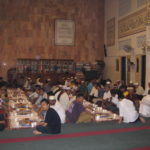The last sermon of Prophet Muhammad (peace be upon him) is known as “Khutbatul Wada” or the “Farewell Sermon.” It was delivered during the Hajj of the year 632 C.E., the ninth day of Dhul Hijjah, which is the 12th month of the Islamic calendar. The day was Friday and the place was the valley of Arafat.
This event occurred ten years after Prophet Muhammad’s migration from Mecca to Medina. The man who had been ruthlessly persecuted by the Quraish tribe for preaching Islam and had set out on foot with just one companion (Hazrat Abu Bakr Sadeeq) delivered this final message to more than one hundred and fourteen thousand followers from all corners of Arabia, to which Islam had spread.
The final sermon
After praising and thanking Allah, the Prophet (peace be upon him) said:
“O People, lend me an attentive ear, for I know not whether, after this year, I shall ever be amongst you again. Therefore, listen to what I am saying to you very carefully and take these words to those who could not be present here today.”
Sanctity of life, property and honor
“O People, just as you regard this month, this day, and this city as Sacred, so regard the life and property of every Muslim as a sacred trust. Return the goods entrusted to you to their rightful owners. Hurt no one so that no one may hurt you. Remember that you will indeed meet your Lord and that He will indeed reckon your deeds.”
Abolition of usury (riba)
“God has forbidden you to take usury (interest), therefore all interest obligation shall henceforth be waived. Your capital, however, is yours to keep. You will neither inflict nor suffer any inequity. God has Judged that there shall be no interest and that all the interest due to Abbas ibn Abd’al Muttalib (his own uncle) shall henceforth be waived…
“Beware of Satan, for the safety of your religion. He has lost all hope that he will ever be able to lead you astray in big things, so beware of following him in small things.”
Rights of women
“O People, it is true that you have certain rights with regard to your women, but they also have rights over you. Remember that you have taken them as your wives only under a trust from God and with His permission. If they abide by your right then to them belongs the right to be fed and clothed in kindness. Do treat your women well and be kind to them for they are your partners and committed helpers. And it is your right that they do not make friends with anyone of whom you do not approve, as well as never to be unchaste.”
Remain steadfast on Five Pillars of Islam
“O People, listen to me in earnest, worship God, perform your five daily prayers, fast during the month of Ramadan, and offer Zakat. Perform Hajj if you have the means.”
Abolition of discrimination on the basis of race and color
“All mankind is from Adam and Eve. An Arab has no superiority over a non-Arab, nor does a non-Arab have any superiority over an Arab; white has no superiority over black, nor does a black have any superiority over white; [none have superiority over another] except by piety and good action.”
Rights of Muslims over each other
“Learn that every Muslim is a brother to every Muslim and that the Muslims constitute one brotherhood. Nothing shall be legitimate to a Muslim which belongs to a fellow Muslim unless it was given freely and willingly. Do not, therefore, do injustice to yourselves.
“Remember, one day you will appear before God and answer for your deeds. So beware, do not stray from the path of righteousness after I am gone.”
Finality of prophethood
“O People, no prophet or apostle will come after me, and no new faith will be born. Reason well, therefore, O people, and understand words which I convey to you. I leave behind me two things, the Quran and my example, the Sunnah, and if you follow these you will never go astray.”
“All those who listen to me shall pass on my words to others and those to others again; and it may be that the last ones understand my words better than those who listen to me directly. Be my witness, O God, that I have conveyed your message to your people.”
 After Prophet Muhammad (peace be upon him) delivered his farewell sermon, the following verses of the Quran were revealed:
After Prophet Muhammad (peace be upon him) delivered his farewell sermon, the following verses of the Quran were revealed:
“This day, I have perfected your religion for you, completed My Favor upon you, and have chosen for you Islam as your religion.” (Surah Al-Ma’idah, 5: 3)
Prophet Muhammad’s (peace be upon him) last sermon is his will and testament to the later generations of Muslims and as valid and binding as it was for those multitudes of believers who had gathered on that momentous day in Arafat.
His sermon emphasizes justice, equality, and sanctity of another person’s life, property, and honor. It warns mankind to beware of Satan’s enmity and not to indulge in usury. It exhorts Muslims to offer their prayers, fast during Ramadan, give charity and perform Hajj and remain steadfast in their following of the Qur’an and Prophet’s Sunnah.
Furthermore, the sermon reminds the Muslims that their responsibility does not end by merely following the religion. They have to propagate the message of Islam to others in the best possible way. His sermon is a reminder that everyone will be fully accountable for their deeds on the Day of Judgment before Allah. The sermon also makes it clear that Islam is the final divine religion and there shall be no more prophets or messengers after Prophet Muhammad (peace be upon him).






